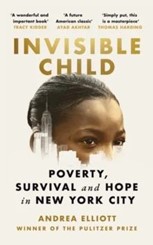Andrea Elliott is an investigative reporter for the New York Times. Her reporting has been awarded, a Pulitzer Prize, a George Polk Award, and a Scripps Howard Award. She lives in New York City. This is her first book.
Andrea Elliott’s riveting debut, Invisible Child: Poverty, Survival, and Hope in New York City, is sure to linger in the minds of many readers as it did mine.
The book takes on poverty, homelessness, racism, addiction, hunger, and more as they shape the lives of one remarkable girl and her family. The invisible child of the title is Dasani Coates. We meet Dasani in 2012, when she is eleven years old and living with her parents, Chanel and Supreme, and seven siblings in one of New York City’s shelters for families experiencing homelessness. At the time, Elliott is researching what would become a five-part series featuring Dasani in The New York Times. The Pulitzer Prize-winning journalist ultimately follows Dasani and her family for a period of eight years, tracking a stunning array of heartrending tragedies and remarkable triumphs.
Elliott encounters the family of ten at the Auburn Family Residence, a “city-run homeless shelter where the heat is off and the food is spoiled” and where the family has resided for over two years, consigned to a 520-sq.-ft. room. During 2013 alone, more than 350 calls to 911 were made from Auburn, with residents making “twenty-four reports of assault, four reports of child abuse, and one report of rape.” The Coates family documents shelter conditions with video cameras provided by Elliott, revealing “footage of mice, roaches, and mold on the walls.”
Yet, Dasani shines. Her middle school principal, Elliott notes, had “seen plenty of distressed children, but few had both Dasani’s troubles and the height of her promise.” Athletically gifted, Dasani excels in gymnastics and track. Her academic talent ultimately results in Dasani enrolling in a boarding school in Pennsylvania that serves children in families with low incomes. There, she has access to many of the resources she’d lacked for much of her life — consistent and healthy meals, a full wardrobe, and freedom from poverty. What she has lost, however, is the daily interaction with her family.
This absence is significant because, for all their struggles, the Coates are a strikingly tight-knit family whose love for each other is apparent. The challenges of poverty and addiction mean that Chanel and Supreme are often unable to fully attend to the needs of their children. That’s where Dasani traditionally stepped in, playing the role of surrogate parent to her seven siblings for much of her childhood.
Elliot says, “To know Dasani Coates…is to reckon with the story of New York City, and, beyond its borders, with America itself.” Still, the book’s reservoir of hope never runs dry, in large part due to the resilience of Dasani and her family. What easily could have been, in lesser hands, voyeuristic or sensational is instead a rich narrative, empathetically told. Elliott is a wonderful storyteller and, by sharing Dasani’s deeply moving story, she calls on all of us to dismantle the systems that so often failed her and countless others.
If you didn’t grow up in racism or poverty in our country, this book will be eye opening.

